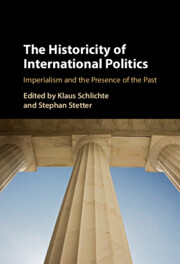Book contents
- The Historicity of International Politics
- The Historicity of International Politics
- Copyright page
- Contents
- Figures
- Contributors
- Acknowledgements
- Introduction
- Part I The Imperial Past and Present in International Politics and IR
- Part II Historical Sociology and the Imperial Fundaments of International Politics
- Part III Global History and the Imperial Fundaments of International Politics
- Conclusion
- Index
- References
Part I - The Imperial Past and Present in International Politics and IR
Published online by Cambridge University Press: 29 June 2023
- The Historicity of International Politics
- The Historicity of International Politics
- Copyright page
- Contents
- Figures
- Contributors
- Acknowledgements
- Introduction
- Part I The Imperial Past and Present in International Politics and IR
- Part II Historical Sociology and the Imperial Fundaments of International Politics
- Part III Global History and the Imperial Fundaments of International Politics
- Conclusion
- Index
- References
Summary

- Type
- Chapter
- Information
- The Historicity of International PoliticsImperialism and the Presence of the Past, pp. 47 - 156Publisher: Cambridge University PressPrint publication year: 2023



